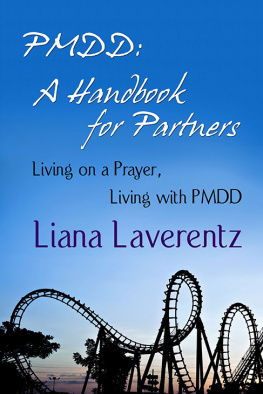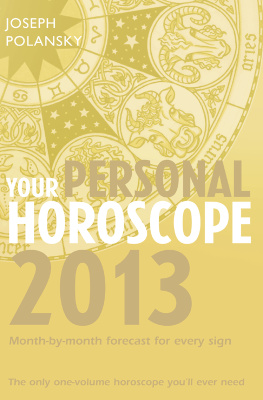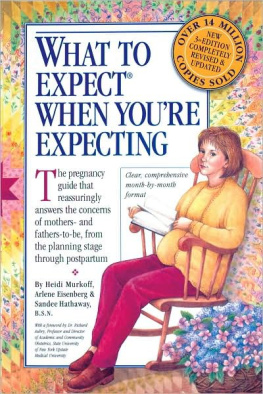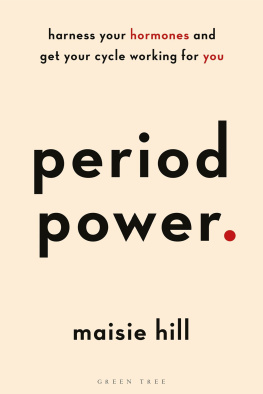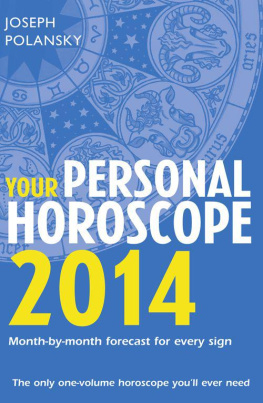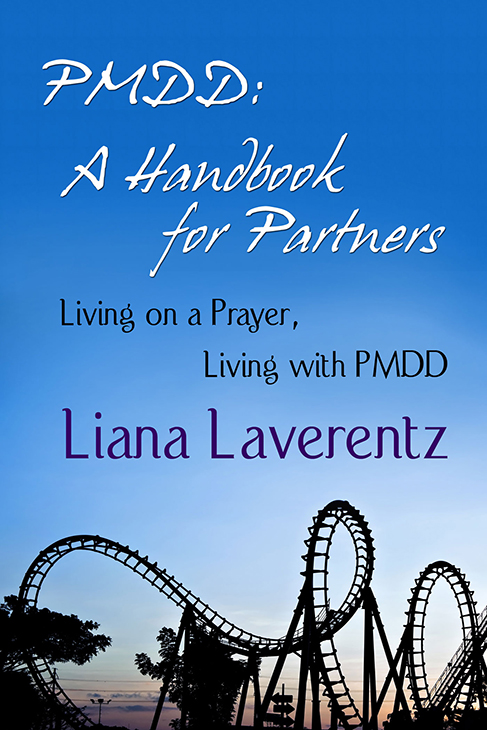
Dedication
To partners of womenwith PMDD everywhere
November 2015
A few years ago I read a book by a famoustelevision personality on happiness, or how to be happy. By all accounts, accordingto that book, I should have been the happiest woman on the planet. In case I mightbe missing a few opportunities for happiness, it offered seventeen powerful tipsfor living a happier life. All of which I at the time already practiced regularly,if not daily.
But still, then and now, on some dayshappiness eludes me. Why is this? Because there are times you simply cannot be happywhen you have PMDD, also known as the mood disorder Pre-Menstrual Dysphoric Disorder.
Plain and simple, during an episodeof PMDD, nothing makes you happy. No-thing. You can have fleeting moments of pleasure,but thats all they are. Fleeting.
Lets break it down. PMDD. That firstD stands for Dysphoric, the opposite of euphoric. Euphoric means happy, dysphoricmeans depressed. As in depression. The kind of depression suffered by at least the164 million people in the United States who were given prescriptions for antidepressantsin 2008 alone. No one knows how many more there are, not being treated with drugtherapy, talk therapy, or any other kind of therapy. Depression, while not a richmans disease, can only be diagnosed and treated if you have the means and mindsetto see a doctor and pay for the treatment.
But PMDD is different. PMDD is a disorderthat comes and goes in concert with a womans menstrual cycle. Actually, disorderis misleading. PMDD is more than a simple disorder of the mind, as defined by theDSM-5 (the bible of the American Psychiatric Association). If left untreated, PMDDcan expand in scope from 2-3 days a month to all but 2-3 days a month, oruntil a woman is left with no good days to enjoy.
PMDD can be inherited, and can beginas early as a womans first period. Mostly, according to medical experts on thesubject, the onset arrives in a womans twenties or thirties, and if left untreated,grows progressively worse until menopause.
As I look back on my life, I can seeI was an early starter. I remember an episode in college that kept me in bed forthree weeks, feeling listless, hopeless, and lethargic. Then suddenly it disappeared,and I had to work like a maniac to complete all my coursework and pass the semester.
Ive often likened my life to that ofa salmon swimming upstream. Always behind, always swimming against the tide, nevermanaging to fully get where I am going. For years I thought it was my time-managementskills. Now I realize it was the PMDD kicking my butt.
When Im not in the throes of PMDD,I can get more done in a day than four people and get more done in a week than mostpeople can in a month. Ive managed projects, contests, social events, PR events,organized banquets, grand openings, conferences, committees, written five books,edited over seventy-five more, and designed and overseen the building of two houses.Ive won awards for most of those things, and have the certificates, plaques, clocks,and trophies to show for it.
When Im having a PMDD episode, I canbarely shower and get dressed. My mind is fuzzy and disoriented, my thoughts scattered,my emotions raw and unstable. I ache all over physically, my brain either feelslike its burning or has an iron band wrapped around it, I feel like I am movingthrough molasses, and I have absolutely no motivation. I dont want to see anybody,much less talk to them, or do much of anything. My prevailing thought patterns are,Why bother? Nobody cares anyway. Whats the use? and Take me now, Lord. Justget it over with and take me. I cant possibly be of use to anyone in this state.
Every negative thought is magnifieduntil I am practically paralyzed as far as decision making goes. That includes decisionsas simple as what to eat or wear. What if I screw up, make the wrong choice? Iknow I willmy PMDD brain is telling me its inevitable. My PMDD brain is alsotelling me that to make such a mistake would be the end of the world.
And I believe it.
Like I said, undiagnosed PMDD can onlyget worse over time. It can also predispose you toward major depressive episodes,both in response to life stresses and during times when women are most vulnerableto depression, such as post-partum, and peri- and post-menopausal. In 2009 I hadan episode that lasted for weeks and weeks and weeks, which set me on the path tostarting my blog, Living on a Prayer, Living with PMDD.
I now know that back then I was experiencinga low-grade perimenopausal depression that my PMDD exacerbated until it became unbearable.It forced me to take the time out to see to my own health and wellnessto put mefirst.
Why didnt I do something about my PMDDearlier? Well, for the first 25 years, I didnt know PMDD existed. I just thoughtI had regular PMS, and since 80% of menstruating women experience some symptomsof PMS, I didnt see why I couldnt just deal with it like everyone else. Was Ireally that incapable of coping with something women deal with every day? My priderefused to allow for that possibility.
Besides, the episodes came and went.And as soon as they went, I was too busy playing catch up to stop and try to figureout what was wrong with me. All I knew was I was free to be myself again, and frankly,for those first 25 years, out of sight was out of mind. I was just grateful to beback on track again.
Until the next time. For years, I consoledmyself with the idea that this too, shall pass, and in a few days it would beover. I could then get on with my life again, as a wife, mother, part-time officeworker, and writer. I didnt realize what a huge disservice I was doing to myself,allowing my PMDD to progress. Besides, I still thought it was simple PMS, and allthe prevailing medical literature at the time said there was nothing I could dobut live with it. To be sure, there were lifestyle and dietary changes I couldmake, and off and on I tried. But every effort seemed to fail after a few weeks,and I thought it was due to a lack of willpower.
Wrong. It was the PMDD. PMDD being cyclicalas it is, what starts out as a brilliant idea and the willpower and determinationbehind it, all too soon devolves into a stupid idea with no willpower or motivationto support it. Sometimes this change in perception comes as soon as two weeks afterthe onset of your period, sometimes youre blessed with a full three weeks beforeyour world view turns upside down again. Your PMDD brain is also a crafty character,and very adaptable to changeor, rather, finding ways to subvert any positive changesyou may make.
PMDD is all about self-preservation,believe me. Theres nothing your PMDD brain wont do to keep running the show. Whenwomen commit suicide to escape their PMDD, chances are they feel its the only wayto shut up the bully in their PMDD brain.
PMDD can strike both around the timeof a womans ovulation, and pre-menstrually. It can also occur post-menstruallyin atypical caseswhich was what confused me for so many years. It wasnt until2010 that I learned it could also occur after your period begins. Mine comeswithout fail on the third day of my periodwhen it chooses to come. It doesnt comeevery month, and sometimes it comes twice a month, which only adds to the confusion.For years I had only mild symptoms pre-menstrually, mostly food cravings and anger,edginess and irritation, with my major depressive symptoms coming after myperiod started.
All the literature I read said the symptomsof PMDD came only pre-menstrually. So I didnt feel I could qualify for a diagnosisof PMDD. Something else had to be going on with me, in addition to what I thoughtwas ordinary PMS, but it didnt have a name that I could find, and I didnt knowhow to go about explaining it to anyone.
Next page
